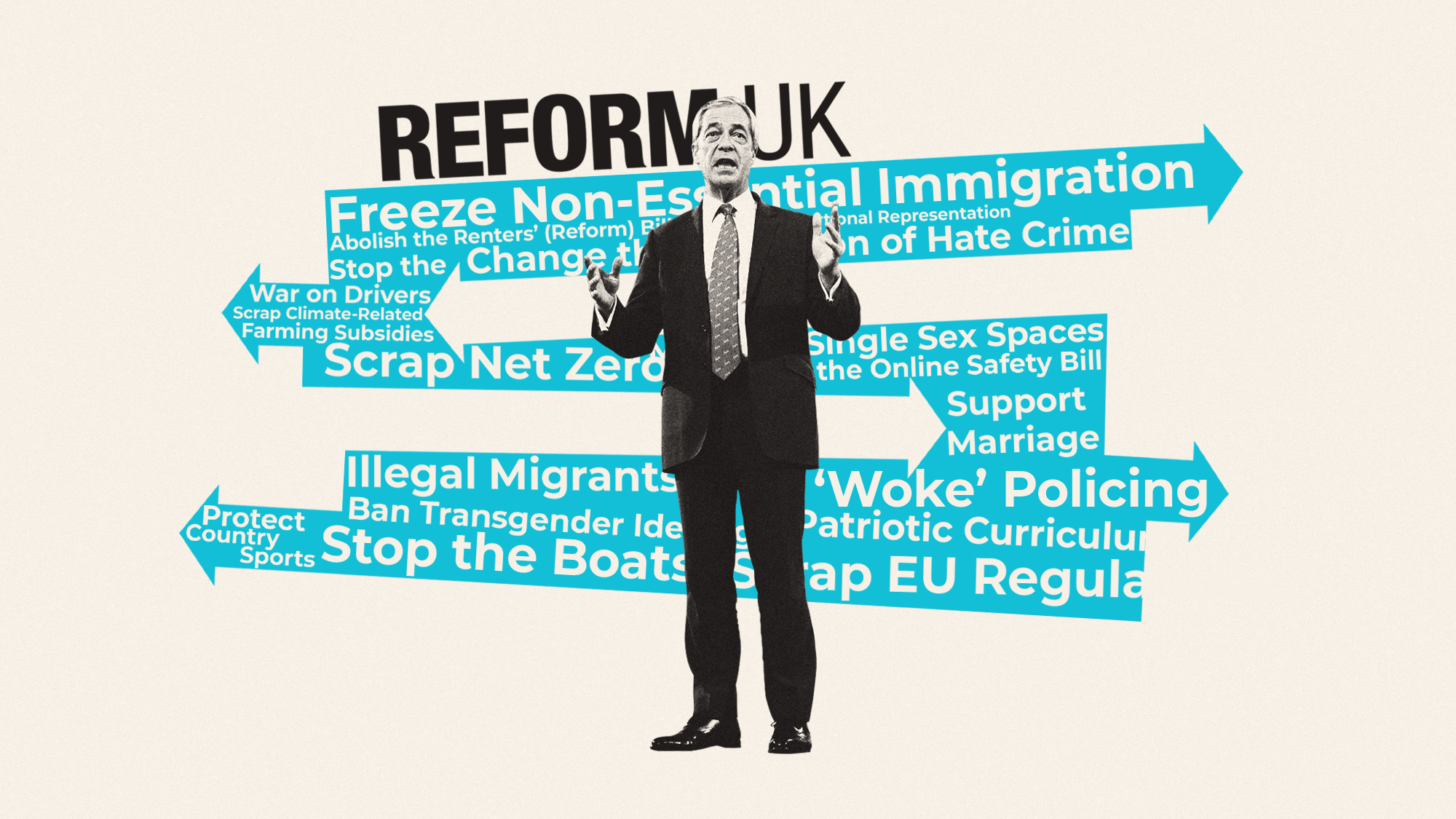What does Reform UK stand for?
Nigel Farage’s party is still ahead in the polls, despite accusations that it is turning into a home for failed Tory ministers

A free daily email with the biggest news stories of the day – and the best features from TheWeek.com
You are now subscribed
Your newsletter sign-up was successful
Suella Braverman has become the latest Tory to defect to Reform, setting out why she believes Britain is indeed “broken” and why Nigel Farage is the only man in British politics “who has been courageously consistent for his country”.
The former home secretary, who served in successive Conservative governments under Theresa May, Boris Johnson, Liz Truss, and Rishi Sunak, told a Veterans for Reform event that “immigration is out of control. Our public services are on their knees. People don’t feel safe.”
“So we stand at a crossroads. We can either continue down this route of managed decline to weakness and surrender. Or we can fix our country, reclaim our power, rediscover our strength.”
The Week
Escape your echo chamber. Get the facts behind the news, plus analysis from multiple perspectives.

Sign up for The Week's Free Newsletters
From our morning news briefing to a weekly Good News Newsletter, get the best of The Week delivered directly to your inbox.
From our morning news briefing to a weekly Good News Newsletter, get the best of The Week delivered directly to your inbox.
Her words echo Reform UK’s own promise to voters: “a country that rewards effort, enforces the law, defends its people, and believes in its future”.
What is Reform UK?
Founded by Nigel Farage in 2018 as the single-issue Brexit Party, it was rebranded as Reform UK in 2021, following the UK’s formal departure from the EU the previous year.
Initially focused on anti-lockdown messages during the pandemic before pivoting to broader right-wing populist themes, Reform has surged in the polls thanks to its ability to offer an alternative to a Westminster elite who, according to Farage, “speak an entirely different language to those who live in the real world”.
Despite running an at-times chaotic and amateurish ground game, the party still secured millions of votes in the 2024 general election. But its real breakthrough came in last May’s local elections: it secured two mayoralties, 677 council seats and overall control of 10 councils, not to mention snatching the parliamentary seat of Runcorn and Helsby from Labour by a mere six votes, in what was widely described a political “tsunami”.
A free daily email with the biggest news stories of the day – and the best features from TheWeek.com
Since then, Reform has consistently topped polls of nationwide voting intention. It has also welcomed a steady flow of Tory defections that have swelled its number of sitting MPs to eight. While the party has hailed this as a sign of strength, it has also opened the door to accusations that it is becoming “Conservatives 2.0”.
What are Reform's policies?
Reform UK has a populist agenda aimed at attracting voters from both the left and the right who are frustrated with the two main parties and feel strongly about issues such as immigration, the costs of net zero and alleged abuses of the welfare system.
Border control
Front and centre of Reform’s policy agenda is its hardline stance on immigration, including a declared “number one priority” to stop the boats carrying migrants across The Channel. The party promises to do this by immediately leaving the European Convention on Human Rights (ECHR), “restoring full control of our borders, intercepting and detaining all illegal arrivals, and deporting them”. It will also “end Britain being treated as a global welfare system, meaning “no more free housing, no more benefits, no more taxpayer-funded incentives for illegal migration”. Reform would also set up a new UK Deportation Command, implement a five-year emergency programme to identify, detain, and deport illegal migrants in the UK - dubbed Operation Restoring Justice - and replace indefinite leave to remain with a renewable five-year visa for migrants with higher salary thresholds, mandatory fluency in English, and stricter good character requirements.
Employment and taxes
To “make work pay”, Reform says it will “cut taxes on workers” and “reduce the burden on families”, although this policy has yet to be fleshed out in detail. Previous manifesto pledges proposing £90 billion in tax cuts were quietly scrapped last year. The party also promises to end “the importation of cheap foreign labour, supporting jobs and wages for British workers” and to prioritise British businesses in procurement by removing unnecessary regulation.
Energy and net zero
Reform proposes scrapping the UK’s 2050 net zero targets and green levies to bring down energy bills, while fast-tracking North Sea oil and gas licences, and doing more to enable fracking.
Policing and security
To “make law-abiding citizens feel safe”, Reform says it will “restore visible policing, much tougher sentencing for serious and repeat offenders – including mandatory minimums, and an uncompromising approach to crime and antisocial behaviour”. Stop and search will be expanded, as will prison capacity “to ensure no violent criminals are released early due to overcrowding, and that judges hand criminals the sentences they deserve”.
The party manifesto promises to “rebuild Britain’s armed forces, invest in capability and readiness” and “restore morale across the military and intelligence services”. This will ensure that “our armed forces are ready to deal with the ever-present threats posed by Russia and China”.
Culture war issues
Farage placed “issues and arguments around gender on the very first page” of his party’s 2024 election manifesto, said The Guardian, condemning the “divisive ‘woke’ ideology” he claims has captured public institutions. The party has vowed to ban the teaching of “transgender ideology” in schools and scrap diversity, equality and inclusion rules. Christian values will be “protected and celebrated”.
Much of what the party has presented draws on a “largely small-state agenda”, said the Financial Times. Farage has in the past called for the NHS funding model to be “re-examined” and Reform’s MPs have voted against Labour’s efforts to strengthen workers’ rights. More recently, however, as the party looks to expand its support base, it has begun “to present more traditionally left-wing economic policies”, such as the nationalisation of key industries.
Will they form the next government?
Reform may have just a handful of MPs and “no meaningful policy platform”, said John Harris in The Guardian following Reform’s party conference last September, but it’s “still on course to either form or lead the next British government”. Why? Because it has a vivid and clear message – about the evils of mass immigration and diversity, and the uselessness of the two main parties.
The Tories and Labour are floundering in the face of the challenge, said Tim Stanley in The Telegraph. The Conservative “crack-up” came first, but Labour is now “hurtling towards its own civil war”, torn between emulating Reform’s hardline rhetoric and stopping a more radical Green Party outflanking it on the left.
An MRP poll from January 2026 put Reform UK on 31%, ahead of the Conservatives on 21%, with Labour in third place on 17%. Were this to play out on election day, Reform would secure 335 seats with an outright majority of 20, putting Nigel Farage in Number 10 as prime minister.
-
 How to Get to Heaven from Belfast: a ‘highly entertaining ride’
How to Get to Heaven from Belfast: a ‘highly entertaining ride’The Week Recommends Mystery-comedy from the creator of Derry Girls should be ‘your new binge-watch’
-
 The 8 best TV shows of the 1960s
The 8 best TV shows of the 1960sThe standout shows of this decade take viewers from outer space to the Wild West
-
 Microdramas are booming
Microdramas are boomingUnder the radar Scroll to watch a whole movie
-
 How corrupt is the UK?
How corrupt is the UK?The Explainer Decline in standards ‘risks becoming a defining feature of our political culture’ as Britain falls to lowest ever score on global index
-
 Three consequences from the Jenrick defection
Three consequences from the Jenrick defectionThe Explainer Both Kemi Badenoch and Nigel Farage may claim victory, but Jenrick’s move has ‘all-but ended the chances of any deal to unite the British right’
-
 The high street: Britain’s next political battleground?
The high street: Britain’s next political battleground?In the Spotlight Mass closure of shops and influx of organised crime are fuelling voter anger, and offer an opening for Reform UK
-
 How cryptocurrency is changing politics
How cryptocurrency is changing politicsIn The Spotlight From electoral campaigns to government investments, crypto is everywhere and looks like it’s here to stay
-
 Nigel Farage’s £9mn windfall: will it smooth his path to power?
Nigel Farage’s £9mn windfall: will it smooth his path to power?In Depth The record donation has come amidst rumours of collaboration with the Conservatives and allegations of racism in Farage's school days
-
 ECHR: is Europe about to break with convention?
ECHR: is Europe about to break with convention?Today's Big Question European leaders to look at updating the 75-year-old treaty to help tackle the continent’s migrant wave
-
 Is a Reform-Tory pact becoming more likely?
Is a Reform-Tory pact becoming more likely?Today’s Big Question Nigel Farage’s party is ahead in the polls but still falls well short of a Commons majority, while Conservatives are still losing MPs to Reform
-
 Nigel Farage: was he a teenage racist?
Nigel Farage: was he a teenage racist?Talking Point Farage’s denials have been ‘slippery’, but should claims from Reform leader’s schooldays be on the news agenda?